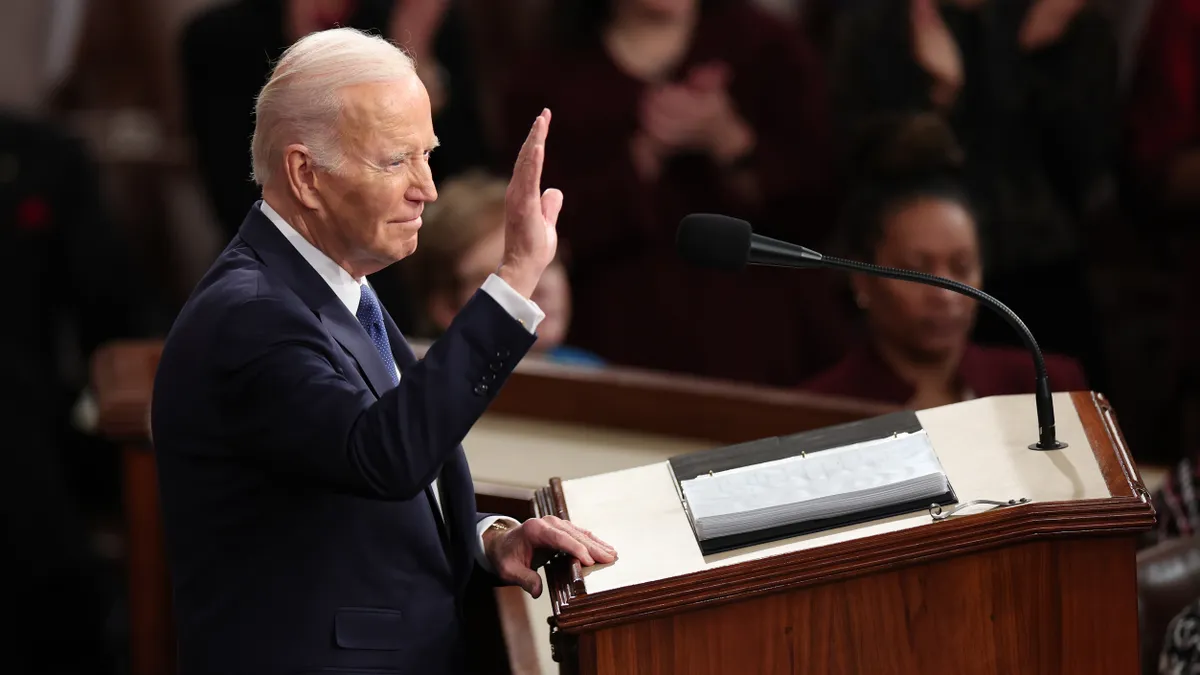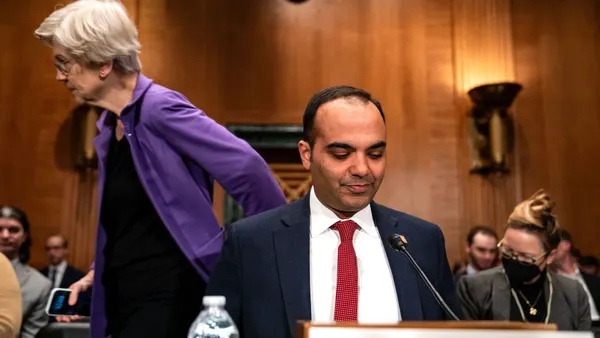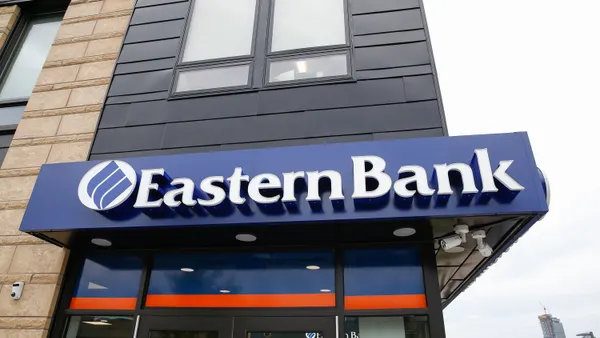Dive Brief:
- Bank and credit union trade groups are pushing back against language in President Joe Biden’s State of the Union address, accusing the president of mischaracterizing some of the fees financial institutions charge consumers.
- During his speech Tuesday, Biden highlighted his administration’s efforts to crack down on “junk fees” and “hidden surcharges” across several industries, including banking, hospitality and travel. “We’ve reduced exorbitant bank overdraft fees, saving consumers more than $1 billion a year,” he said, adding his administration’s Junk Fee Prevention Act would further block companies from “ripping us off.”
- In statements released in response to the president’s address, trade groups said the administration is conflating bank fees, which lenders use to extend credit, with charges other industries levy on consumers, such as internet and resort fees.
Dive Insight:
"Junk fees may not matter to the very wealthy, but they matter to most folks in homes like the one I grew up in," Biden said. "They add up to hundreds of dollars a month. They make it harder for you to pay the bills or afford that family trip. I know how unfair it feels when a company overcharges you and gets away with it."
Some trade groups argue, however, that bank overdraft fees shouldn’t fall into the junk fee bucket, since customers opt in to the service, and some rely on it to pay their bills.
The term “junk fee” is overly broad and ignores the needs of low-income and middle-income consumers, said Credit Union National Association President and CEO Jim Nussle, who warned against eliminating a service some people depend on.
“Consumers use overdraft protection as a safety net — protecting them from life’s challenges,” he said in a statement Tuesday. “Without the option of overdraft protection — people are more likely to turn to predatory lenders, hurting the same people the administration seeks to help.”
The Consumer Bankers Association pushed back against the president’s assertion that overdraft fees are hidden.
“[B]anks operate in the most competitive, well-regulated industry in the world and are required by law to provide clear disclosures aimed at empowering consumers to make informed financial decisions,” CBA CEO Lindsey Johnson said in a statement Tuesday.
Biden’s statements fail to recognize that some Americans rely on bank products like overdraft to pay their bills, she argued.
“Instead of mischaracterizing an entire industry, policymakers across the ideological spectrum should work in tandem with banks to find durable solutions to the economic challenges we face as a nation, including expanding consumers’ access to the financial tools they demand and deserve,” she said.
The Independent Community Bankers of America said Biden’s language misrepresents bank services that are “clearly disclosed” to consumers, and contracts that many customers voluntarily enter into.
“Given these realities, current community bank practices are appropriate and do not constitute surprise ‘junk fees,’ despite the misrepresentation of the community bank business model by President Biden and the Consumer Financial Protection Bureau,” ICBA CEO Rebeca Romero Rainey said in a statement Tuesday. “ICBA and the nation’s nearly 5,000 community bankers intend to continue working with the administration to mitigate the negative impact of CFPB rulemakings and to avoid further mischaracterizations.”
During Tuesday’s address, Biden also highlighted the CFPB’s proposed rule to reduce credit card late fees to $8 from roughly north of $30.
The CFPB estimates the proposed rule could reduce late fees by as much as $9 billion a year.
The National Association of Federally-Insured Credit Unions, however, said the Biden administration and the CFPB “are not giving Americans the full picture.”
“Consumers rely on safe, reliable short-term credit to afford daily life,” NAFCU CEO Dan Berger said in a statement Wednesday. “This rule will severely restrict the market for credit cards, making those products harder to qualify for and increasing the cost of all other financial products and services. For Americans with low credit scores or lower incomes, this rule would cripple their ability to achieve any sense of financial security.”
In a statement last week, the American Bankers Association said the CFPB’s proposal would harm consumers by reducing competition and increasing the cost of credit.
“[A]ny reduction in the late fee safe harbor would have a significant adverse impact on a substantial number of community banks and credit unions with assets below $850 million, many of which would be forced to exit the credit card market altogether,” ABA CEO Rob Nichols said in a statement.












